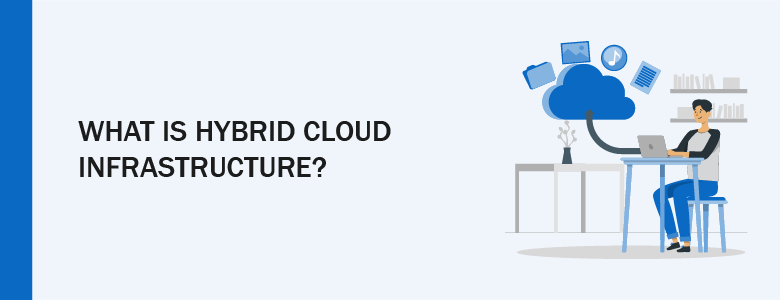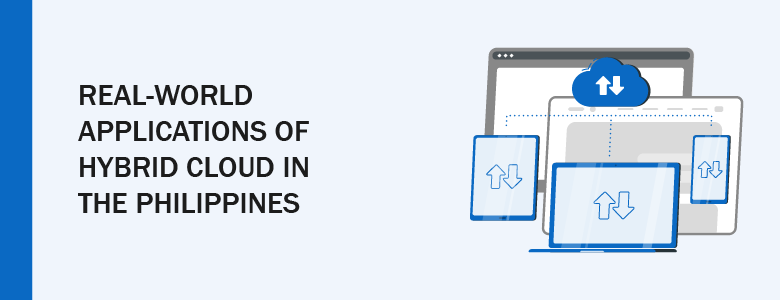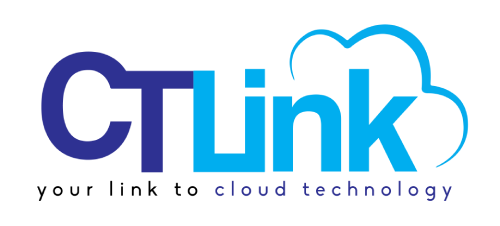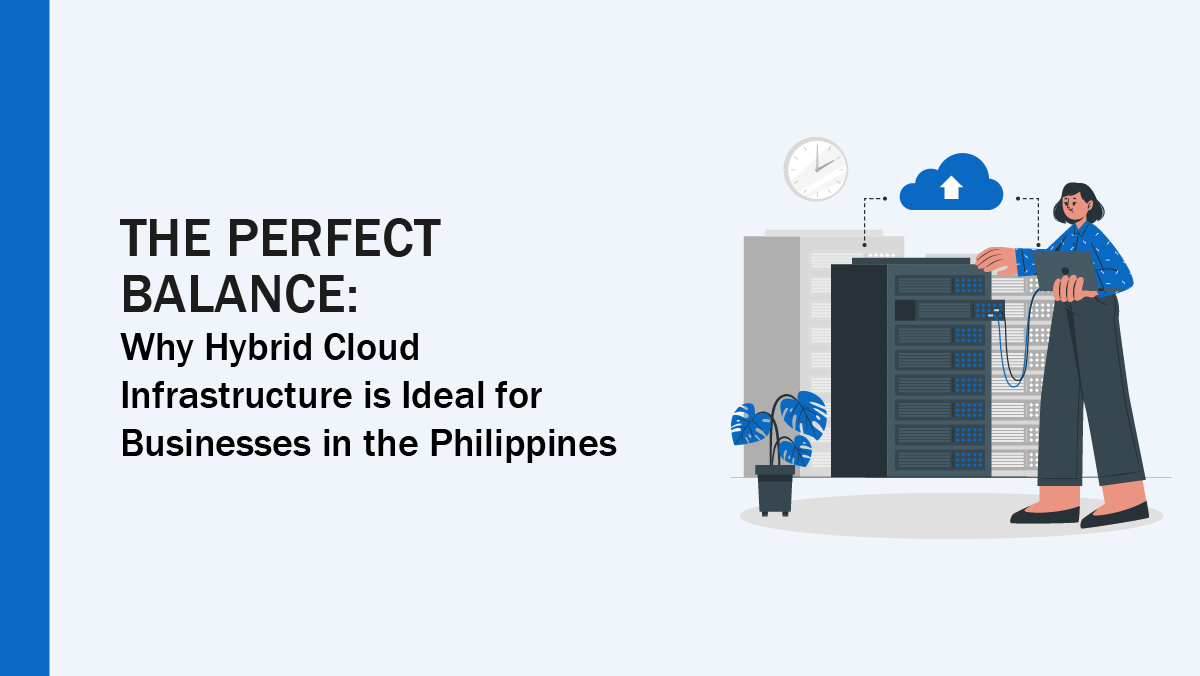Businesses in the Philippines are rapidly adopting digital transformation to stay competitive in a growing economy. But when it comes to IT infrastructure, choosing between on-premise solutions and full cloud adoption can be challenging. Factors like cost, Internet reliability, and data security all play a role in this decision.
Hybrid cloud infrastructure offers a middle ground. By combining on-premise systems with cloud resources, businesses can enjoy the best of both worlds. This approach provides flexibility, cost-efficiency, and enhanced security, making it an ideal choice for enterprises in the Philippines.
What is Hybrid Cloud Infrastructure?

Hybrid cloud infrastructure is a computing environment that integrates on-premise data centers with public and private cloud services. Instead of relying solely on one type of infrastructure, businesses can distribute their workloads across both on-premise and cloud platforms. This allows for greater flexibility, scalability, and security.
For example, sensitive data can be stored on-premise for security and compliance, while less critical applications can leverage the cloud for scalability.
Why Hybrid Cloud is Gaining Popularity in the Philippines

Businesses in the Philippines face unique challenges that make hybrid cloud infrastructure particularly appealing. Here are some key factors driving adoption:
Internet Reliability Issues
Despite improvements in connectivity, Internet reliability remains a challenge, especially in rural areas or during peak usage times. Relying solely on the cloud can disrupt operations if internet access is lost.
With hybrid cloud infrastructure, businesses can keep critical operations on-premise to ensure continuity, while still benefiting from cloud resources for other functions. This reduces the risk of downtime due to connectivity issues.
Data Sovereignty and Compliance
The Philippines has stringent data privacy regulations that require businesses to handle sensitive data responsibly. For sectors like finance, healthcare, and government, data sovereignty—keeping data within the country—is a critical concern.
Hybrid cloud allows businesses to store sensitive data on-premise for compliance purposes, while still using the cloud for non-sensitive operations. This approach helps businesses meet local regulatory requirements while optimizing their infrastructure.
Cost-Effectiveness
Full cloud adoption can be expensive, especially for businesses with large data sets or ongoing workloads. Cloud costs can quickly add up due to data transfer fees, storage costs, and scaling requirements.
With hybrid cloud, businesses can keep high-demand or frequently accessed data on-premise, reducing cloud expenses. They can also use cloud resources selectively for specific tasks, balancing performance and cost.
Scalability and Flexibility
One of the key advantages of hybrid cloud infrastructure is its flexibility. Businesses can scale their operations up or down as needed by leveraging cloud resources. This is particularly useful for industries that experience seasonal spikes, such as retail, e-commerce, and hospitality.
For example, during the holiday shopping season, an online retailer can use cloud resources to handle increased traffic, while maintaining core systems on-premise. This ensures seamless customer experience without over-investing in permanent infrastructure.
Security and Disaster Recovery
Cybersecurity threats are on the rise in the Philippines, making it essential for businesses to have robust security measures in place. Hybrid cloud infrastructure allows for a multi-layered security approach.
For example, during the holiday shopping season, an online retailer can use cloud resources to handle increased traffic, while maintaining core systems on-premise. This ensures seamless customer experience without over-investing in permanent infrastructure.
- On-premise data centers can be secured with physical access controls and internal security protocols.
- Cloud services often come with built-in security features, such as encryption and threat detection.
Additionally, hybrid cloud solutions make disaster recovery more efficient. Businesses can back up critical data in the cloud while keeping primary copies on-premise. In the event of data loss or cyberattacks, recovery is faster and more reliable.
Real-World Applications of Hybrid Cloud in the Philippines

Many industries in the Philippines are leveraging hybrid cloud infrastructure to address their unique operational needs. Here’s a closer look at how various sectors are benefiting:
Financial Services
Banks and financial institutions use hybrid cloud to maintain security and compliance while enhancing customer services. Sensitive data like transaction records are kept on-premise to meet regulatory requirements and uphold data sovereignty. Cloud services, on the other hand, support customer-facing functions such as mobile banking and real-time analytics.
For example, banks can process transactions securely on-premise while using cloud resources to generate financial insights and provide seamless online banking experiences.
Healthcare
Hybrid cloud helps healthcare providers manage patient data securely while improving service delivery. On-premise infrastructure ensures compliance with privacy regulations, while cloud services support telemedicine, medical imaging, and appointment management.
Hospitals can store patient records securely on-site while using the cloud to enable efficient remote consultations and access to diagnostic tools.
Retail and E-commerce
Retailers benefit from hybrid cloud by managing critical operations locally and scaling online services during peak demand. On-premise infrastructure supports POS systems and inventory management, while cloud resources handle surges in website traffic during sales events.
For instance, retailers can ensure reliable in-store transactions while using the cloud to handle online orders and customer engagement during holiday seasons.
Education
Educational institutions leverage hybrid cloud to balance security and accessibility. Student records are stored on-premise for data protection, while cloud services facilitate remote learning and collaboration.
Universities can securely manage enrollment data on local servers while using cloud-based platforms for virtual classrooms and academic resources.
Education
Government agencies use hybrid cloud to protect sensitive citizen data while enhancing service delivery. Critical information remains on-premise for security, while cloud services improve accessibility for public-facing applications.
For example, government offices can securely store official records on-site while using cloud platforms to process online applications and public inquiries efficiently.
Hybrid cloud infrastructure is transforming the way businesses in the Philippines operate. By combining the security and reliability of on-premise systems with the scalability and efficiency of cloud resources, organizations can stay resilient, flexible, and competitive.
For businesses looking to adapt to the digital economy, hybrid cloud isn’t just a strategy—it’s the future of IT infrastructure.
Ready to explore hybrid cloud for your business? Contact us today through marketing@ctlink.com.ph to learn how we can help you build a hybrid cloud strategy tailored to your needs.

